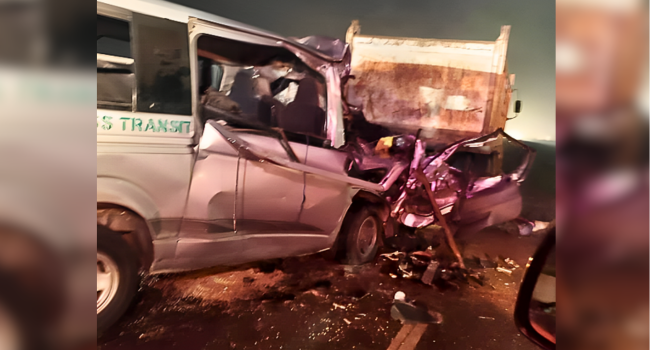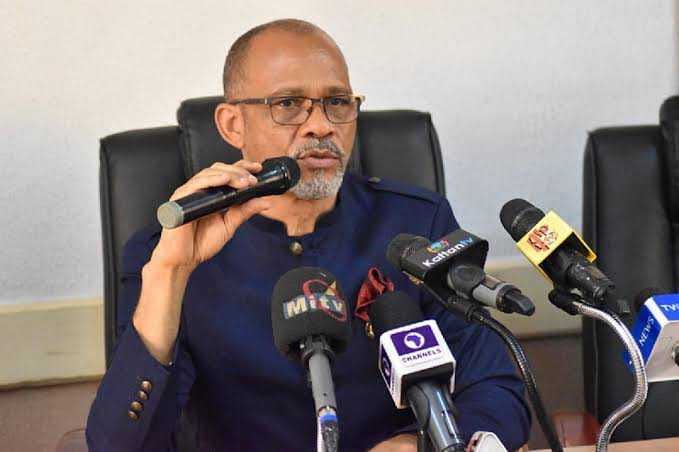Nation
Road traffic crashes soared by 24.23% in Q4 2023

– Speed violation ranks top causative factor
Despite notable progress, road traffic crash remains a big issue in Nigeria. This is evident in the report released by the National Bureau of Statistics (NBS) on Road Transport Data for Q4 2023, which revealed that 1,323 persons died as a result of road traffic crashes in the fourth quarter of 2023.
In Q4 2023, 2,717 road traffic crashes were recorded, indicating a 24.23% increase from 2187 cases recorded in Q3 2023. However, in a year-on-year review, the Q4 2023 road traffic crash data was a 33.12% decrease from 3,617 recorded in Q4 2022.
An analysis of this report revealed that 1,772 were serious cases, while fatal and minor cases were 687 and 258 respectively. This shows an increase of 29.13%, 24.87%, and 9.32% respectively when compared to the previous (Q3) quarter.
Based on the report, the top causative factor of road traffic crashes in the period under review was speed Violation, with 1681 cases. In addition to this, commercial vehicles made up 68.41% of the 3,371 vehicles involved in road traffic crashes in Q4 2023.
According to data from the World Health Organisation (WHO), 1.19 million people die every year from road traffic crashes with those under 30 being the most affected age group.
A 2019 report by World Population Review revealed that globally, the United States has the highest rate of road accidents with 1,949,000 cases. Germany ranks second in the world with close to 300,143 cases, while Turkey ranks third in the world with 174, 896 cases.
However, Africa has the highest fatality rate of all the continents in the world with 26.69 deaths per 100,000 people annually. Zimbabwe ranks the first country with the highest mortality rate in Africa with 41.2 deaths per 100,000 people, Central African Republic ranks second with 37.7 deaths per 100,000 people, Democratic Republic of the Congo (DRC) is the third country with 34.9 mortality rate per 100,000 people, while Nigeria ranks 31st with 20.7 deaths per 100,000 inhabitants.
A Federal Road Safety Corps (FRSC) official, who spoke with our correspondent on condition of anonymity due to official reasons attributed the high rate of road traffic crashes to human factors, stating that Nigeria has a huge percentage of unqualified drivers on its roads.
“Mostly, we have unqualified drivers on Nigerian roads, hence leading to a high rate of crashes on the road. Someone can get a car and start driving, but did the person go to the driving school? This can be categorized under the human factor. Initially, we used to have a lot of unregistered driving schools. This led to the implementation of a new rule by the FRSC, which mandates every driving school to undergo the registration process before accreditation,” he said.
He highlighted the various causative factors contributing to the cases of road traffic crashes, including over-speeding, alcohol intoxication, and distraction, among others.
“The most common cause of crash is over-speeding because moving at a high speed can lead to a crash. The second one is the consumption of alcohol and hard drugs. This is mostly common among commercial bus drivers. That is why we say don’t drink while driving, and if you drink don’t drive. This is because your calculation will be very wrong and driving on the road is all about calculation. You must have the ability to see four cars in front of you and four cars behind you.
“Distraction is another cause of road crashes. This is in the aspect of using your phone while driving, playing loud music, and using hands-free. When driving, your five sense organs must be on alert. You have to be focused. If you make any little mistake, a crash can occur within seconds. No distractions should be allowed when driving. Recently, FRSC said using Google Maps when driving is an offence, because, in the process, your attention is diverted. Alternatively, ask for directions, or park your car to check the map. You can also use Google Voice Maps, which is allowed. With this, you can hear but you won’t press your phone. Also, beating the red traffic light is another cause of crashes,” he explained.
Our source talked extensively on the introduction of the speed limit device by FRSC, as part of the intervention to curtail the rate of road traffic crashes in Nigeria and control the speed rate of drivers.
“FRSC has been contemplating reducing road traffic crashes, especially on the issue of over-speeding. That was why we introduced the speed limit device. If the speed limit device is connected to a car, it controls the speed rate of a driver. If a driver moves beyond the normal speed rate, the car will go off by itself. It gives a sign if you are over-speeding before it goes off. We tried to introduce this to all kinds of vehicles, and we were able to liaise with registered transport companies to ensure that all their commercial buses have a speed limit device.
“If we check your car and discover that you don’t have one, you will be booked and the speed limit device must be fixed. It is also an offence if you tamper with the speed limit device. Through this, we have reduced the road traffic crash. However, some private car owners do not comply with this rule,” he stated.
He further stated the challenges FRSC officials encounter while discharging their duties, disclosing that most challenges are from the state governments and road users.
“One of the challenges we face is commercial drivers telling us we only have rights on federal roads. However, we still try our best to go to their various parks and garages to enlighten them about the benefits of the speed limit device. We don’t get involved in issues concerning state traffic control, but we hope states join us in enlightening road users on the benefits of a speed limit device. In the process of saving the lives and properties of your fellow humans, you are being accused of another thing like extortion. Most states are not helping us. Most times they tell us ‘Is it a federal road? What are you doing here? You aren’t supposed to be here. Most challenges are from the state and road users,” he added.
Contrary to general belief, he noted that poor road infrastructure wasn’t a major factor contributing to the road traffic crashes but over-speeding and human factors as stated earlier.
“If the road is bad, you as a car owner know you have to drive safely. Bad road is not a major factor but it is one of the factors. The way we speed on a newly repaired road is alarming. If the road is good, with the inexperienced drivers we have in Nigeria, we would still experience road traffic crashes.
He urged the government to implement stricter laws to ensure compliance with road safety rules and emphasized the need for other states to emulate the vehicles’ roadworthiness exercise carried out in Lagos state.
He recommended safety tips to prevent road traffic crashes on Nigerian roads.
“Every driver should believe that he is the only sane driver on the road. Every driver should engage in the WOFT procedure. When going out you should check the Water level, the Oil, Fan belt, and Tyres before driving because road traffic crashes can occur through mechanical failure. Use the safety gear when driving. Seatbelts are there for a reason, which is for safety. Do not overtake when you are close to the bend and know the road traffic signs,” he advised.



